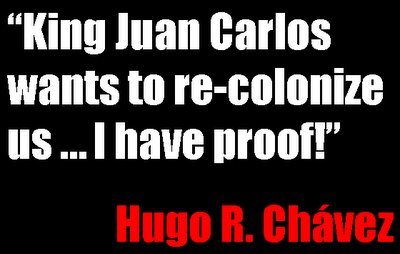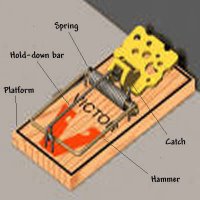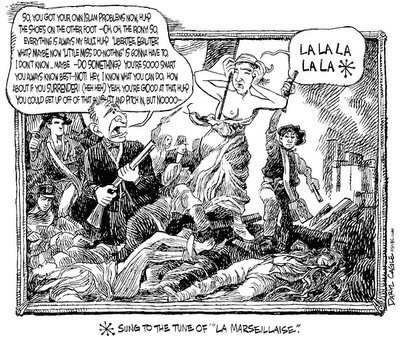
Cesar Chavez and Robert F. Kennedy
Different times, different Chavez and different Kennedy
PMBComment: It might be fair to say that without oil Hugo Chávez would have never been elected president. By 1998, bountiful oil had made the task of governing Venezuela seem like a simple – i.e. requiring little talent – routine of distributing relatively easy to exploit natural wealth. This flawed conception explains why the two main political parties, AD and Copei, brazenly fielded a former beauty queen and an untrained septuagenarian in the 1998 election. As a result, Chávez’s victory, feasible in theory due to decreasing standards, was also effortless in practice, and a surprise only to the winner who had started the year with less than 3% in the polls.
We can also state today that sans oil – and a desperately sought oil price run up - Hugo Chávez would have never lasted in power long enough to inflict the kind of permanent institutional damage that will almost certainly be his deplorable legacy.
Therefore, it should come as no surprise to find oil, and its main byproduct – oil money, in every nook and cranny of Mr. Chávez’s ploy to buy consciences and meddle in the internal affairs of other nations.
Just this week, we saw an on-his’s-knee Nestor Kirchner from Patagonia, Argentina pleading for more cash, and a member of the Kennedy family from Boston, Massachusetts trying to sugar coat - as energy charity - his long sought role of propaganda stooge for the Caracas government.
On the latter development, Sunday’s Boston Globe ran a front page story (read below in full) under the triumphant title “Thousands in Massachusetts to get cheaper oil”. The subheading states that “[Congressman Willliam] Delahunt, Chávez help broker deal”, and the story goes on to inform us that according to Citizens Energy Corp, “the approximately $9 million deal will bring nine million gallons of oil to [45,000] families and three million gallons to institutions that serve the poor, such as homeless shelters”.
Citizens Energy Corporation is the non-profit company set up in 1980 by Joseph P. Kennedy II, son of the late Robert F. Kennedy. According to the Globe, CEC is expected to sign this deal with CITGO, PDVSA’s wholly owned U.S. affiliate, today.
At the risk of appearing cold hearted, I will provide some of the very relevant elements not covered by the Boston paper that might put this self-serving and shamelessly political initiative in the proper context.
First, this is not a novel idea. Citizens got going in 1980 as a result of Venezuela’s decision to grant a term crude contract to 26-year-old Joe Kennedy who was then trying to prove that oil majors were somehow delivering rather expensive heating oil to residents in the northeastern United States. The idea was deemed worthy, and given the go ahead by Humberto Calderon Berti, Venezuela’s Oil Minister at the time (Calderon was also instrumental in the signing of San Jose Accord through which Caribbean and Central American nations were able to access favorable funding terms for their oil purchase from Mexico and Venezuela). The difference in those cases was that Venezuela’s government was not trying to rub its good deed - which in the Citizens’ case consisted in approving a small allocation of crude volume at officials prices in a very tight market were contracts were commanding premiums - in anyone’s face. As I remember, Calderon’s sole request was that some of the profit that might result from the not-for-profit scheme should be plowed back into energy conservation initiatives in Central American and the Caribbean. The first years of Citizen's cheap fuel program were stellar, and small scale conservation projects were funded in Costa Rica, Jamaica and even in Venezuela. After a few years, with the company making most of its money as a plain vanilla oil trader, Joe Kennedy capitalized his initial goodwill into a seat in the U.S. Congress (from were he retired in 1998 after six terms).
Second, it is important to remember that Venezuela, up to 1999, had always been THE MOST reliable source of imported energy for the U.S. During the 1973 Arab Oil Embargo it parted ways with its OPEC brethren and agreed to increase production to compensate for the shortages created by that retaliatory act. Since coming to office in 1999, Hugo Chávez chose to obliterate that record of reliability and pursue recklessly high prices instead of mutually convenient production increases. He scuttled PDVSA’s 10-year plan which would have Venezuela producing close to 5.5 million today (versus barely 2.7 MM it produces today). Over the years, the aspiring autocrat has repeatedly threatened to cut oil shipments to the U.S. for all sorts of concocted reasons. Today, Venezuela is considered to be a “highly unreliable source” of imported energy and as a result the entire Western Hemisphere has lost certain degree of energy independence and security.
Third, the most noticeable consequence of this strategy of constraining production has been higher prices for consumers all over the world. It is estimated that the “Chávez” premium can be anywhere between $7-10 per barrel. Venezuela is the most hawkish –and unrepentant - of price hawks within OPEC. Chávez frequently say that “the fair price of oil should be closer to $100/barrel”. His threats to suspend shipments to the U.S. are a welcome source of volatility - ergo profits - for speculators. So, while 45,000 families in the Boston area might be getting a “three week” reprieve thanks to Mr. Chávez’s largesse, EVERY family in the U.S. is paying much more EVERYDAY for gasoline, diesel, heating oil, lubricants, electricity and so on, because of Hugo Chávez recklessness. U.S. consumers in turn are funding most of Chávez subversive schemes in the Hemisphere (keep in mind that the U.S. buys 70% of Venezuelas oil exports at full price, while Venezuelan consumers and many countries in Latin America get huge politically driven discounts).
Fourth, Citizens Energy owns no terminal, does not own a fleet of trucks and is not capable of qualifying low income families as eligible recipients of this “cheap oil”. The latter task is performed by Community Action Programs. In 1980, CITGO was not yet part of PDVSA, and an intermediary was appropriate (the CEC scheme was also a lot more complex involving cut rate third party refining and transportion). But given CITGO’s significant presence in the Northeast, this “assistance” could have been arranged directly with the Commonwealth and through the CAPs. So what is Citizen’s and Joe Kennedy’s role in all this? What about Bill Delahunt? I do not know for sure. To me, they are allowing themselves to be used by an uncouth tormentor of Human Rights, who is hell-bent not only on making life difficult for the U.S. Administration, but is also on record (on multiple occasions) rejecting everything the U.S. stands for. While trying to earn some political capital by “doing good” in their home turf cannot be considered a felony, doing so by becoming accessories to a self declared enemy of the U.S. falls well short of conscientious citizenship.
Fifth, Joe Kennedy feels that he has covered his back against the above charge by haplessly stating the following ''You start parsing which countries' politics we're going to feel comfortable with, and only buying oil from them, then there are going to be a lot of people not driving their cars and not staying warm this winter…There are a lot of countries that have much worse records than Venezuela. At the end of the day it's not our business to go choosing other peoples' leaders, particularly when they are duly-elected democratic leaders." What he seems to forget is that no other government is trying to hoodwink the U.S. public into thinking that they are direct descendants of Robin Hood. The other, maybe equally undesirable, governments simply sell their oil to whoever is willing to pay for it, and at times, have been precluded from even doing that by Democrats in the White House. In a recent Op-Ed Senator John Kerry was much more on target when he actually criticized President Bush for allowing “thugs like Hugo Chávez and Fidel Castro to distort and propagandize the interest and actions of the U.S., isolating the U.S. from millions with whom we share a common heritage and innumerable interests”. (Since this moral short circuit involves liberal democrats from Massachusetts, I will leave it to them, and Teddy Kennedy, to sort it out in the dining room table).
Sixth, by stating that he is only dealing with “the duly-elected democratic” leader of Venezuela, Joe Kennedy conveniently brushes aside the fact on September 11, 2001, all the democratic nations of the Hemisphere (including the U.S and Venezuela) signed a Democratic Charter that defines democracy in much more exacting terms than simply being the natural and hence acceptable outcome of “democratic elections”. While this might be a comprehensible oversight for a private sector executive, it is a huge failing for the scion of a family that prides itself on its rigorous approach to freedom, democracy and Human Rights around the world. I am convinced that a number of individuals who are risking all to highlight and reverse Venezuela’s current state of affairs would qualify for the Robert F. Kennedy Human Rights Award. Somehow I am certain Hugo Chávez, fraudulent largesse and all, will never be an RFK laureate.
Seventh, over the last few years it has been maddening to observe Representative Delahunt acting as Hugo Chávez main cheerleader/apologist in the U.S. Congress. No matter how evident Mr. Chávez’s anti-U.S. designs and rhetoric have become, Delahunt was there ready to explain, to dump dirt on the Venezuelan opposition and to take pot shots at the Bush Administration. Just last week, after a hearing on Democracy in Venezuela in the House of Representatives a number of congressional staffers wondered aloud as to Delahunt’s REAL motivation. Now we all have the answer, and it is clearly partisan, self serving and therefore debased.
And finally, in a recent conversation I had with Joe Kennedy on this same subject he screamed at me that his only interest was to “help the poor folks in Boston”. I googled all these good intentions and found a story in the Boston Herald that stated that “entities related to his Citizens Energy Corp. paid him [Joe Kennedy] more than $400,000 in 2003, the last year for which records are available.” Not bad for a non-profit executive willing to lend his name to a $9 million foreign disinformation campaign. PMB
Disclosure note: some of the facts in this note are well known to me because as a 22-year-old college student, I helped Joe Kennedy - at the request of his uncle Senator Kennedy, for whom I had worked in 1976 as an intern - present his case to Minister Calderon and to the folks at PDVSA, a company I never dreamed then I would work for, and much less become a Board Member of many years later. I consider Joe a friend, and I had a closer relationship with his late brother Michael, but I first and foremost consider Hugo Chávez a grave threat to my country - and beyond. I hope Joe will eventually understand this, but if he does not, there is nothing I can do.
Additional reference: letter written by Venezuelan Ambassador to Senator Pete Domenici (R-NM), Chairman of the Energy and Natural Resources Committee, explaining the "humanitarian" objectives of this "cheap" oil-for-political-havoc scheme.
The Boston Globe
Thousands in Mass. to get cheaper oil
Delahunt, Chávez help broker deal
By Michael Levenson and Susan Milligan, Globe Correspondent and Globe Staff November 20, 2005
A subsidiary of the Venezuelan national oil company will ship 12 million gallons of discounted home-heating oil to local charities and 45,000 low-income families in Massachusetts next month under a deal arranged by US Representative William D. Delahunt, a local nonprofit energy corporation, and Venezuela's president, White House critic Hugo Chávez.
The approximately $9 million deal will bring nine million gallons of oil to families and three million gallons to institutions that serve the poor, such as homeless shelters, said officials from Citizens Energy Corp., which is signing the contract. Families would pay about $276 for a 200-gallon shipment, a savings of about $184 and enough to last about three weeks.
The contract is to be signed Tuesday by officials from Citizens Energy, based in Boston, and CITGO, a Houston-based subsidiary of Petróleos de Venezuela SA. The contract was arranged after months of talks between Delahunt, a Quincy Democrat active in Latin American affairs, and Chávez, a leftist former paratrooper and fierce critic of the Bush administration.
''We recognized that we had an opportunity," Delahunt's spokesman, Steve Schwadron, said yesterday.
Chávez showed ''an inclination to do a humanitarian distribution" of oil, and poor families in Massachusetts had a ''desperate need" for relief from high home-heating prices, Schwadron said. He characterized the deal as one between ''a US company and two nonprofits to help them do more of what they already do, with terms that mean the price is good."
Delahunt was not available for comment yesterday.
Schwadron said the congressman did not get involved in the details of the contract, but had raised the issue with Chávez and helped connect the nonprofits with CITGO, which is owned by PDV America Inc., an indirect, wholly owned subsidiary of Petróleos de Venezuela SA, the national oil company of Venezuela.
When the discounted oil arrives early next month, Citizens Energy -- whose chairman and president, former US representative Joseph P. Kennedy II, also helped arrange the contract -- will screen recipients with the help of local organizations that serve the poor. Some 350 local dealers will then distribute three-fourths of the oil to local families.
MassEnergyConsumer Alliance, a nonprofit group that also offers discounted oil, will distribute or sell the remaining quarter to homeless shelters, food banks, and low-income housing groups, said Larry Chretien, the group's executive director. Recipients must apply for the help, he said.
Home heating oil prices are expected to increase by 30 percent to 50 percent this winter because of rising oil prices, Chretien said. Because funding for the federal Low Income Heating Assistance Program is expected to pay for only one delivery of heating oil to eligible households, the CITGO agreement could help ease the crunch on some families, he said.
''Fuel assistance is woefully underfunded, so this is a major shot in the arm for people who otherwise wouldn't get through the winter," Chretien said. He said he hoped the deal would present ''a friendly challenge" to US oil companies -- which recently reported record quarterly profits -- to use their windfall to help poor families survive the winter.
Some foreign-policy analysts said Chávez helped broker the deal in part as a jab at President Bush. Chávez has frequently belittled the White House, saying it is not doing enough to help the poor, and he has called Bush an ''assassin" and a ''crazy man." Now, he has helped arranged for 285,000 barrels of oil to arrive in Massachusetts at a 40 percent discount over the next four months. Each barrel contains 42 gallons.
''It is a slap in the face" to the Bush administration, said Larry Birns, executive director of the Council on Hemispheric Affairs, a group that tracks Latin American politics and government. ''Chávez is involved in petro-diplomacy."
Chávez has drawn criticism from human rights groups for his treatment of political foes and curbs on media freedoms. But he has also become a hero to some on the left who say he has helped improve conditions for the poor in his country and drawn attention to US foreign policy in Iraq and Latin America.
On Friday, a US State Department spokesman declined to comment on the oil deal with Chávez.
Schwadron said Delahunt's involvement had nothing to do with Venezuela's strained relationship with the Bush administration and was meant as a specific effort to ease high heating costs for Bay State residents.
Massachusetts already gets a great deal of oil from Venezuela, Chretien said, and the deal with CITGO means only that the oil will be less expensive. He added that he has never been approached with such an offer from a US oil company.
''We did not negotiate foreign policy here," Schwadron said. ''We steered clear of that."
Kennedy said he was not concerned about Chávez's politics.
''You start parsing which countries' politics we're going to feel comfortable with, and only buying oil from them, then there are going to be a lot of people not driving their cars and not staying warm this winter," Kennedy said. ''There are a lot of countries that have much worse records than Venezuela. At the end of the day it's not our business to go choosing other peoples' leaders, particularly when they are duly-elected democratic leaders."
Kennedy said Delahunt has been working with Chávez ''for years now and has gone down there many times and developed a personal relationship with him."
Chávez has used his influence in the global market before.
In August, he offered discounted home-heating oil to poor communities in the United States after meeting in Caracas with the Rev. Jesse Jackson.
© Copyright 2005 The New York Times Company
Read more of this PMBComment!











